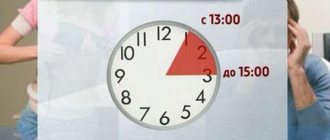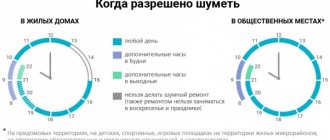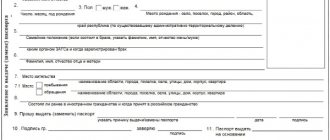Federal Law 52 - the law on silence and noise in the new edition
Any citizen of our country, according to the law, has the right to complete rest. Therefore, the silent mode must be observed by everyone without exception. A person who makes noise at night will be punished under federal law under Section 52. It states when being noisy is considered a misdemeanor.
Noise is a global problem for every citizen. The fact is that a person is almost constantly in a noise zone: in a store, . However, everyone wants to relax after a hard day of work or school.
Thus, noise is a disturbance of silence, the sources of which can be the following factors:
- high-pitched conversations or scandals between apartment residents;
- loud music;
- crying of children (in particular infants);
- dog's bark;
- loud operation of household appliances (for example, a washing machine);
- noise emanating from the movement of cars;
- unloading and loading operations.
- repairs from neighbors;
In order to observe the law of silence in a residential building, residents must comply with the rules of residence, as well as know and live on the basis of the law “On Silence”. For example, there are types of noise that ordinary citizens cannot influence.
These are emergency work, investigative actions and the like. The latest edition of Federal Law No. 52 “On the sanitary and epidemiological welfare of the population,” published on November 28, 2020, includes 60 articles.
Based on the legislation of the Russian Federation, it is prohibited to open any companies (cafes, buffets, hookah bars) in an apartment building. However, situations are becoming more frequent when the law on maintaining silence is violated. In such cases, the heads and managers of these institutions undertake to immediately take measures to isolate sound in the room.
As for repairs, they should be carried out in a residential building exclusively during the day.
The fact is that families with children who need healthy and sound sleep can live in one of the apartments. No less important
New law on silence in 2020, what awaits lovers of loud parties
Domestic legislation enshrines the right of every Russian to proper rest. Therefore, it is prohibited to make noise at night, because such actions directly violate the rights of our other compatriots. Not long ago, officials of the Russian Federation announced when a new law on silence would come into effect in our country and what measures would be taken against violators of this law.
Let us remember that the anti-noise law was first adopted twenty years ago. Naturally, during this period, the impact of noise from gadgets that can produce it has changed greatly. Therefore, this law needed to be at least updated.
The new draft defines when people are allowed to hold noisy parties and have fun.
It is important to remember that during the existence of this law it has been supplemented several times, however, the only rule that has always been is the prohibition of loud and harsh sounds, including repair work or the active celebration of various events.
The domestic parliament reported when the new law on silence will begin to work. This issue was commented on by the representative of the Liberal Democrats, Yaroslav Nilov, who is also the head of the State Duma Committee on Labor and Social Policy.
“We believe that we need to adopt our bill, which is being considered by the State Duma, and give the internal affairs bodies the authority to hold accountable those who violate the law on silence at night, creating unbearable conditions for our citizens,” Nilov said.
The Russian Federation Council has already prepared some amendments, according to which they propose to introduce a ban on noise on Sundays and during non-working holidays, as well as on weekdays and Saturdays from one to three in the afternoon and from seven in the evening to nine in the morning. At the same time, it is reported that local authorities can adjust the hours of silence in the regions under their control.
Quiet time for everyone
The main difference between this law and all its previous versions is the need to maintain silence not only at night. This law will include the concept of a general quiet period.
This concept will regulate two hours of the day, when, by analogy with the night, it will be prohibited to make loud sounds. For now, such hours are offered either from twelve to two in the afternoon, or from one to three.
Representatives of each region must independently choose which period is best suited for their territory.
In addition to apartment buildings, this rule must also be observed in the following organizations and buildings:
- In a sanatorium, boarding house and holiday home
- In kindergartens, boarding homes and playgrounds
If the silence regime in such places is not observed, the person will be subject to administrative liability, which is prescribed in the relevant law. In other words, the violator will have to pay a fine.
What noise standards are acceptable?
There are two known concepts in the world regarding noise level, namely equivalent and maximum. The first means the level of constant noise, which is measured over a certain period of time. The second means the highest sound level for the same period.
During daylight hours, the permissible noise level is considered to be forty decibels, because that’s how much an ordinary human voice can produce. At night, the noise threshold is reduced by another ten units.
I would like to note that this threshold is quite low, because if people start screaming, the volume level can reach hundreds of decibels.
Therefore, it is important to understand that screaming at night can be considered a violation of the law regarding silence.
On holidays and weekends, at this time silence should be observed until ten o'clock in the morning. The only exception is New Year's Eve, during which it is allowed to organize noisy festivities and parties, during which loud music may well sound.
Responsibility for violating public order
Each person, existing in a social society, is obliged in his behavior to take into account the interests of the people around him. Society has established rules of behavior, mutual respect and responsibility for breaking order.
Someone wants to sleep after a hard day at home, someone wants to get home by bus in complete peace and quiet. He has the right to this, and his right is guaranteed by regulations.
Violating public order in the country is not only an administrative offense, but also a criminal offense. The material in this article will tell you what awaits troublemakers and hooligans, and what rules apply in a safe society. Public order is the rules of behavior of citizens in society, established by legislative acts, generally accepted moral norms, traditions and customs.
Anything that is out of the ordinary may be considered a public nuisance. For example, you can’t walk naked down the street, you can’t make loud noise, you can’t go to the toilet in the wrong places, etc.
Such actions in society can be represented by two types:
- Legal is behavior that is prescribed by law as unacceptable. As a rule, such violations seriously threaten public safety, the life and health of people, and their property.
- Non-legal - these are norms that have developed in society, but are not enshrined in law. As a rule, in this case, attackers can only face reprimand from others.
Illegal actions may include pushing people on public transport, not wanting to give up a seat on a bus, or using obscene language in crowded places.
The current legislation contains about a hundred violations of public order.
Violation of public order at night article
This initiative was taken by the Legislative Assembly of the Jewish Autonomous Region.
The project proposes to supplement the Code of Administrative Offenses with the article “Violating the peace and quiet of citizens at night.” Under this article, an ordinary person who gives his neighbors a restless night will have to pay a fine of one thousand to two thousand rubles. If the organization broke the silence, the fine will be much higher.
A legal entity will pay from 30 to 50 thousand rubles. For example, a fine may be issued to a restaurant that produces excessively loud music. WATCH THE VIDEO ON THE TOPIC: Until what time can you make noise in an apartment Violation of peace and quiet Recently, cases of citizens filing complaints about violation of peace and quiet at night have become more frequent.
According to Art. The use of televisions, radios, tape recorders, other sound-reproducing devices, as well as sound amplification devices, including those installed on vehicles, retail facilities, facilities in which household services are provided, catering services, market services, resulting in a violation of the peace and quiet of citizens at night time at protected facilities in St. Petersburg entails a warning or the imposition of an administrative fine on citizens in the amount of five hundred to four thousand rubles; for officials - from five thousand to ten thousand rubles; for legal entities - from twenty-five thousand to fifty thousand rubles. Screaming, whistling, knocking, moving furniture, singing, playing musical instruments and other actions that entail a violation of the peace and quiet of citizens at night at protected objects in St. Petersburg, entail a warning or the imposition of an administrative fine on citizens in the amount of five hundred to four thousand rubles; for officials - from five thousand to ten thousand rubles; for legal entities - from twenty-five thousand to fifty thousand rubles.
Law on Silence Petrozavodsk 2020
- Chamber of Control and Accounts of Petrozavodsk City District
- Petrozavodsk City Council
- Collegiums, commissions, public and expert councils
- Territorial election commissions
- Municipal organizations
- Municipal competitions
- Chapter
- Information from authorities, institutions and organizations of the Republic of Kazakhstan and Petrozavodsk
- Administration
- At what time in Karelia is it forbidden to carry out repair work and make noise in an apartment building? Answers from lawyers (2) Looking for an answer? It’s easier to ask a lawyer! Law on silence in Karelia 2020 Law on silence from January 1, 2020 Mouthpiece of Petrozavodsk Until how much noise can you make in an apartment in 2020 Until how much noise can you make in an apartment according to the law of the Russian Federation 2020 Until how much noise can you make in an apartment at home according to the law of the Russian Federation 2020 Until when does Russian legislation allow make noise in your apartment From when and until how much can you make noise in an apartment on weekdays and weekends How long can you make noise in an apartment according to the law of the Russian Federation 2020 Ivanovo How to write a statement against your neighbors for violating living conditions and silence? Answers from lawyers (4) Have a question for a lawyer? Looking for an answer ?
Law on Silence in Karelia 2020
Allowance by the owners, owners of non-residential buildings, structures, structures or persons authorized by them to be on such buildings, structures, structures of pollution, inscriptions, drawings, as well as failure by these persons to take measures to maintain the appearance of the facades and enclosing structures of such buildings, structures, structures in violation rules established by municipal legal acts in the field of improvement of territories of settlements, urban districts - entails a warning or the imposition of an administrative fine on citizens in the amount of one thousand to two thousand rubles; for officials - from five thousand to ten thousand rubles; for legal entities - from ten thousand to fifteen thousand rubles.
The mayor's office of Petrozavodsk reported that they receive complaints from citizens about violation of peace and quiet by neighbors, as well as enterprises located on the first floors of apartment buildings or carrying out work in the immediate vicinity of the house.
Noise at night Objects where peace and quiet must be ensured at night are also noted.
Among them: territories of populated areas, horticultural, vegetable gardening and dacha non-profit associations, apartment and residential buildings, local areas, hotels, hospitals, holiday homes and other public places.
Law on silence in Petrozavodsk 2020
Applications are accepted both in writing and through the electronic reception. You can also call the unified information service of the Moscow City Hall by phone. Night gatherings Sometimes in the evenings noisy groups gather near the shops, disturbing residents with loud conversations, music and even fights.
Thus, in 2020, updates to this law came into force in Moscow: the noise level from 7.00 to 23.00 should be no more than 40 dBA; noise limit at night (23.00 - 7.00) - up to 30 dBA.
Such restrictions were introduced specifically so that residents of apartment buildings have the opportunity to protect themselves from harmful noise. This also applies to visitors to medical institutions, schools, and kindergartens.
Moscow No. 42 in 2020, night time is considered to be the period from 23 pm to 7 am.
: Characteristics of an 8th grade student in a guardian family
Law on Silence" in St. Petersburg in 2020 - how it works
The State Duma is considering a draft of a new “federal law on silence” in apartment buildings, which is designed to streamline regional norms and consolidate provisions on protecting the peace of citizens in the Housing Code of the Russian Federation and the Code of Administrative Offenses of the Russian Federation. In particular, the document proposes to establish official night time from 22:00 to 6:00.
More serious liability in monetary terms is provided for construction, repair and loading work if it disturbs the peace of citizens at night. An exception is provided only when it comes to cleaning and loading snow.
The project manager, Igor Nazarov, received the journalists extremely unkindly and immediately began calling the lawyer, stating that there was permission from the mayor’s office for round-the-clock work.
But he categorically refused to show the documents, which did not help clarify the situation. Nazarov also did not want to tell who exactly issued the paper.
It is noteworthy that the project manager also did not remember the name of the laboratory that carried out noise measurements at the construction site.
Igor Nazarov also explained that the residents of house No. 40 did not approach him with complaints (which is not surprising - the construction site is surrounded by a fence, the gates of which are closed, and the reception provided to journalists cannot even be called friendly). At the same time, the project manager immediately added very contradictorily that builders always compromise with residents.
Silence law in 2020
The bill was first adopted by the State Duma in 1999. Since then, due to the imperfection of the primary norm, amendments have been regulated, which sometimes even appeared several times per year.
• in the Krasnoyarsk Territory it is customary to observe a silence regime within the time period from 10 pm to 9 am, while the functioning of the legislation applies to all work that may generate noise;
Law on silence in Perm 2020
- apartment buildings and private households;
- hospital premises;
- boarding houses and sanatoriums, as well as other health-improving complexes;
- 24-hour preschool institutions;
- premises of a school or lyceum;
- children's boarding schools;
- homes for elderly citizens and disabled people;
- hotel rooms;
- living rooms in a dormitory;
- entrances, elevator cabins and stairwells of multi-apartment residential buildings.
In case of violation of the law on silence in Perm, administrative fines are imposed, which will depend on who commits illegal noisy actions and for the umpteenth time, as well as on the degree of harmfulness of such actions in relation to others. If the law on silence in Perm is violated by an individual, then upon the first violation he will need to pay an administrative fine in the amount of 1,500 rubles; subsequent violations of this nature imply a penalty in the form of a fine of 2,000 to 3,000 rubles.
Daytime silence law in 2020
The long history of the law on silence began in 1999, when the State Duma of the Russian Federation adopted its first edition.
The imperfection of the norm adopted by legislators is partly due to the fact that many of them did not have to deal with the noise level of an apartment building with poor noise insulation.
Corrections and amendments have been made several times since then, but the number of complaints about noise levels at night and during the day has not decreased.
The noise level is measured in decibels, daytime higher than nighttime, and for houses located near highways 10 units are added to the generally accepted figure.
The new law provides for the right of every citizen to call a representative of the supervisory authority and measure the level of noise created by neighbors or workers.
Exceeding the norm gives grounds for going to court, issuing a warning for the first time, and in case of repeated complaints, it threatens to impose a fine, the amount of which is equal to double the minimum wage.
: Terms for returning goods in Axon
How to find the law on silence in the Republic of Karelia
1.
Violation of the peace and quiet of citizens from 22:00 to 7:00 (and on weekends and non-working holidays established by federal legislation from 22:00 to 8:00) in the territories of populated areas, horticultural, gardening and country non-profit associations, in apartment buildings and residential buildings, in adjoining buildings territories, in hotels, hospitals, rest homes and other public places, expressed in loud singing, shouting, whistling, the use of sound-reproducing devices and sound amplification devices, repair, household, construction and other work (with the exception of emergency recovery, rescue and other urgent work related to ensuring the safety or uninterrupted functioning of life support facilities for the population, as well as actions performed during cultural events permitted by state authorities of the Republic of Karelia or local governments) or in the commission of other actions accompanied by loud sounds - entails a warning or imposition of an administrative fine on citizens in the amount of one thousand to two thousand rubles; for officials - from three thousand to five thousand rubles; for legal entities - from five thousand to ten thousand rubles.
Note.
In accordance with the Code of the Russian Federation on Administrative Offences, an official in this Law should be understood as a person who permanently, temporarily or in accordance with special powers exercises the functions of a representative of the government, that is, vested in the manner prescribed by law with administrative powers in relation to persons who are not in their official capacity. depending on him, as well as a person performing organizational-managerial or administrative-economic functions in state bodies, local government bodies, state and municipal organizations, as well as in the Armed Forces of the Russian Federation, other troops and military formations of the Russian Federation. Managers and other employees of other organizations, as well as persons engaged in business activities without forming a legal entity, who have committed administrative offenses in connection with the performance of organizational-managerial or administrative-economic functions, bear administrative responsibility as officials, unless otherwise established by federal law.
New Federal Law “On Silence” in Russia in 2020
Noise is one of the most pressing problems for metropolitan residents. Noise surrounds people everywhere: in transport, at work, in a shopping center. Every person comes home and wants to relax, gain strength in peace and quiet. Why can someone violate this right? Noise is a disturbance of silence caused by various factors, for example:
According to the law, catering establishments (cafes, restaurants, karaoke bars, etc.) cannot be opened in residential buildings. But in practice, it happens when the law is not fully observed.
At the same time, the owners of such establishments are obliged to take measures to soundproof the premises. Even beauty salons located in apartment buildings can cause considerable trouble for neighbors without soundproofing.
For example, the constant operation of a hair dryer and other noisy appliances.
Violation of public order at night article
About 80% of the population experiences discomfort from noise. In Russian cities, in places of increased acoustic pollution, on average, more than 60% of the population of these cities live.
In Russia as a whole, in different regions, up to 80% of the population is affected by this type of pollution, which greatly affects the life expectancy of citizens.
The legislation almost completely lacks significant administrative liability for any harmful noise impacts in public or residential buildings, as well as adjacent areas at night, and liability for violation in most cases is resolved through regional legislation. In most regions of the country, laws of direct action have appeared that limit the noise impact on the health of citizens, which disrupts their silence and rest, especially citizens staying in homes, hospitals, sanatoriums and rest homes.
The Constitution provides that the exercise of human freedoms must not violate the freedoms of others.
Federal Law No. 52 “On Sanitary and Epidemiological Welfare”, as well as various sanitary rules, hygienic standards and technical regulations requirements contain norms that determine permanent sources of noise exposure, including during the daytime - most often, such an unfavorable situation arises due to short-term noise impacts (car horns, turning on car radios, etc.)
d.). According to the Russian Housing Code, the owner of the premises is obliged to keep it in proper condition, while not allowing it to be neglected.
The Rules for the Use of Premises and Maintenance of the House, in force until 2005, approved by Ministerial Resolution No. 415 of September 25, obligated employers “to not allow actions that create increased noise or vibration that violate the living conditions of citizens in other residential premises. The use of televisions, tape recorders and loud-speaking devices may be permitted provided that audibility is reduced to an extent that does not disturb the peace of the residents of the house.
Violation of public order at night by the Code of Administrative Offenses of the Russian Federation
Every person after a hard day wants to relax in peace and quiet.
We recommend reading: Emergency physician consultant functions
Also, silence after 23:00 is necessary if there are small children in the house who sleep according to a schedule, or elderly people who are used to going to bed early.
Residents of the house must comply with the rules, otherwise they face a hefty fine. It is a mistake to believe that if neighbors complain about excessive noise, it means that they are harmful and scandalous.
The fact is that doctors believe that at 150 dB a person can lose their hearing. That is why there are noise limits that cannot be exceeded.
Otherwise, the violator may be subject to administrative liability. Avoiding conflict is not difficult, just follow the rules and not make noise at night. How to deal with noise after 23:00: noise limits, exceeding which impairs hearing Some people purchase a special device that determines the noise level in decibels.
For those who do not have such a mechanism, here are some examples:
- heavy music above 120 dB is dangerous for hearing;
- Also, the noise of the machines should not exceed 85 dB, otherwise problems will arise.
- Children's screaming above 75 dB threatens hearing impairment;
- Conversation above 50 dB also negatively affects hearing;
- airplane turbine noise exceeding 120 dB has a negative impact on hearing;
- leaf noise exceeding 40 dB is harmful to hearing;
During the day, all these norms can be exceeded, since there will be no fine for this.
The only thing is that you will significantly worsen your hearing. As for night time, there should be no loud sounds after 23:00.
Quiet Laws Excessive noise at night is a public nuisance. In accordance with the law of the Russian Federation, a fine is established for this violation. Info In these cases, the motive is to satisfy the individualistic need for self-affirmation by belittling and ignoring the merits of other people.
5. The theory of administrative law classifies the sign of public danger as a mandatory feature that characterizes an offense (for the sign of public danger, see the commentary to Article 2.1)
Administrative fine for violating silence and noise at night
» Every resident of Russia has the right to a well-deserved rest after a hard day and guaranteed silence at night.
Violation of this right is not permitted due to strict control by Russian legislation. However, not everyone still knows what fines are provided for violating silence and how to bring the offender to justice. The legislation of the Russian Federation provides for certain rules regarding maintaining silence at night and some during the day.
At certain hours, established by regulations of state and regional authorities, loud noise is not allowed both during construction work and in the house or in the area nearby (for example, when a car alarm is running for a long time). At night, any strong noise implies an encroachment on the peace of a citizen, but during the day it is much more difficult to get rid of it, since usually noise during daylight hours falls within the definition of acceptable, in accordance with Federal Law No. 52 of 1999 on March 30. This law regulates the permitted level of noise at night and during the day.
Although it is recommended to negotiate with people disturbing the peace in a peaceful manner, every citizen has every right to contact the police to bring the troublemakers to administrative responsibility.
Existing ways to resolve the situation without the intervention of law enforcement agencies:
- conversation with people disturbing the peace (for example, quite often noisy neighbors do not suspect that they can be clearly heard in the evening, so a simple conversation and explanation of the situation can be most effective);
- treatment with someone authorized to keep order in your home.
If none of the above methods help, you need to call the police or go to court if other methods of resolving the conflict situation cannot be used. We recommend the article: . The time period during which the peace of residents must not be disturbed varies
Silence Law 2020 and what's new in 2020
All citizens of Russia, according to the law, have the right to proper rest. Noise at night is an unacceptable situation that violates the rights of every person. A citizen who violates the order pays a fine.
Attention! If you have any questions, you can consult a free chat with a lawyer at the bottom of the screen or call the hotline Free call for all of Russia.
Other regions
The only option to avoid punishment is to adhere to the established rules. Novgorod and some large cities are distinguished by loyal, accepted regimes of calm.
Regional modes:
- In the Samara region 22:00-8:00. Daylight saving time reduces the limit by an hour, so no loud activities are allowed from 23:00.
- In Krasnodar and the Krasnodar region, silence lasts 8 hours. Silent mode starts around 23:00.
- In the Arkhangelsk region, noise is prohibited from 22:00.
- In the Krasnoyarsk Territory, the period starts at 22:00 and lasts 11 hours. Sunday is the day when construction activities are prohibited.
- Residents of Tyumen observe peace between 10:00 pm and 8:00 am. Boundaries are provided for working days.
In Crimea, the calm regime was extended, as well as in the Tyumen region. Similar temporary silent intervals are observed in Yekaterinburg and the Sverdlovsk region, Altai Territory. From 10 a.m. to 6 a.m. it is prohibited to make noise while in Tatarstan. The norm for the Kaliningrad region is 23:00-8:00.
Quiet on weekends and holidays
On non-working days and holidays, night rest begins at 22:00 and ends at 10:00. In some cases, accepted additional projects shift the limit by an hour. Finishing, installation, and other work are undesirable even before nightfall.
The private sector and residential premises in the Stavropol Territory, the Volgograd Region, and the Komi Republic, as in any other region of the country, adhere to the same rules: if a citizen lives in his own home, he is obliged to observe a quiet regime if noise reaches his neighbors. Repair activities related to ensuring the safety of building residents are allowed even at night.
Bottom line
If the Federal Law is observed, a violator of law and order faces a warning, a fine, or even going to court. Dealing with law enforcement agencies is the easiest threat to a peace breaker.
If neighbors constantly exceed the permissible volume level and are not ready for dialogue, the injured party needs to record illegal actions, then contact higher authorities - the source of general discontent is punished.
PreviousNextAttention! If you have any questions, you can consult a free chat with a lawyer at the bottom of the screen or call the hotline Free call for all of Russia.
Law on disturbing the peace and quiet of citizens at night 2020
» » » Every citizen has the right to ensure peace and quiet from his neighbors or neighboring businesses.
True, it is quite difficult to achieve this right on the part of the injured parties, but with their active position, correct application of the rules of law and sequence of actions, it is quite possible to achieve the desired effect. For the correct sequence of actions, victims need to know their basic rights and what legal acts should be used for protection.
Dear readers!
Our articles talk about typical ways to resolve legal issues, but each case is unique.
If you want to find out how to solve your specific problem, please contact the online consultant form on the right.
It's fast and free! Or call us at: +7 (499) 703-47-59 Moscow, Moscow region St. Petersburg, Leningrad region Federal number (free call for all regions of Russia)! Here it is necessary to discuss the problems of the emergence of administrative liability for violation of peace and quiet by citizens.
In accordance with sanitary and epidemiological standards, each person can tolerate constant noise of up to 55 dB during the daytime and 40 at night without harm to health.
However, the standards set restrictions only in relation to physiological requirements; they say nothing about living comfort conditions. However, these standards require constant increase in large cities due to the increase in noise levels in them. For example, noise during road works is estimated to be up to 100 dB, the sound of a running motorcycle - up to 90 dB, busy traffic of cars on the streets - up to 80 dB, the sound of car horns - up to 120 dB.
The need for residents to comply with sanitary standards in apartments is regulated by Rospotrebnadzor (the right is regulated in the Code of Administrative Offenses of the Russian Federation).
Noise level and decibels
We have repeatedly mentioned the concept of “maximum permissible noise level”. Noise, like any other sound, is measured in decibels.
Sanitary standards in residential apartment buildings set noise limits at night and during the day. In accordance with them, during the day the volume should not exceed 55 dB. And at night the maximum threshold drops to 45 dB. But how can an ordinary person understand what these numbers mean? Here are some examples:
- a calm conversation between two or three people – 35-40 dB.
- screaming and swearing – 55-60 dB.
- regular screwdriver – 60 dB.
- vacuum cleaner – up to 80 dB.
- A motorcycle engine operating at low speeds is 100 dB.
- repair work (Puncher, hand saw) – 110 dB.
- music in a nightclub - 120 dB.
- 140 dB (this volume corresponds to the sound of an airplane flying nearby) is the pain threshold. After this, hearing impairment may begin.
Please note: it turns out that SanPiN standards will in any case be violated during repair work. Unfortunately, this is a legislative contradiction with which nothing can be done now - no one can prohibit people from making repairs in their apartments. We need to negotiate humanly.
Violation of Public Order at Night Code of the Russian Federation
- Legislation of the Russian Federation
- home
- By virtue of Part 1 of Art. 1. 1 of the Code of Administrative Offenses of the Russian Federation, legislation on administrative offenses consists of this Code and the laws of the constituent entities of the Russian Federation on administrative offenses adopted in accordance with it.
Thus, the rules of law containing a ban on committing actions that disturb the peace of citizens at night, as well as the rules of responsibility for such actions, are adopted by the authorities of your region. “Law on silence” - what kind of law is it?There is no federal “silence law.” Moreover, there is no law with this name.
Silence laws are regional laws that contain legal norms prohibiting disturbing the peace and quiet of citizens at night under threat of punishment - a warning or a fine. Each region of Russia has its own rules on prohibiting making noise at night. The procedure for bringing to justice for disturbing the peace of citizens at night is regulated by the norms of the Code of Administrative Offenses of the Russian Federation. However, as stated above, the ban itself, as well as the rules on liability, must be adopted by regional authorities, which determine what is “night time”, what is the scope of liability (amount of fine), which objects fall under the protection of the law.
On the Internet you can easily find regional laws providing for liability for disturbing the peace of citizens at night in your region. What is "night time"? Each region defines its own night time. For example, according to the Moscow law “On maintaining the peace of citizens and silence in the city.”
Moscow" No. 42 dated July 12, 2012 , night time - the period of time from 23:00 to 7:00.
In accordance with Part 1 of Art. 10.1 Law
Law on silence in the Leningrad region - how much noise can you make?
Conflicts related to excessive noise levels arise not only in houses between neighbors, but also on the street, in local and municipal areas. The Law on Silence in the Leningrad Region 2019 (the official text is available for download below) establishes the time of silence and the time when citizens can engage in activities that produce loud noises.
We will tell you in more detail where noise restrictions apply, when you can and cannot make repairs and listen to music loudly, what punishment awaits violators of the peace and quiet of citizens.
Violation of public order at night by the Code of Administrative Offenses of the Russian Federation
Every person after a hard day wants to relax in peace and quiet.
Also, silence after 23:00 is necessary if there are small children in the house who sleep according to a schedule, or elderly people who are used to going to bed early. Residents of the house must comply with the rules, otherwise they face a hefty fine. It is a mistake to believe that if neighbors complain about excessive noise, it means that they are harmful and scandalous.
The fact is that doctors believe that at 150 dB a person can lose their hearing.
That is why there are noise limits that cannot be exceeded. Otherwise, the violator may be subject to administrative liability. For those who do not have such a mechanism, here are some examples:
- Conversation above 50 dB also negatively affects hearing;
- airplane turbine noise exceeding 120 dB has a negative impact on hearing;
- leaf noise exceeding 40 dB is harmful to hearing;
- heavy music above 120 dB is dangerous for hearing;
- Also, the noise of the machines should not exceed 85 dB, otherwise problems will arise.
- Children's screaming above 75 dB threatens hearing impairment;
During the day, all these norms can be exceeded, since there will be no fine for this.
Avoiding conflict is not difficult, just follow the rules and not make noise at night. How to deal with noise after 23:00: noise limits, exceeding which impairs hearing Some people purchase a special device that determines the noise level in decibels.
The only thing is that you will significantly worsen your hearing. As for night time, there should be no loud sounds after 23:00. Quiet Laws Excessive noise at night is a public nuisance. In accordance with the law of the Russian Federation, a fine is established for this violation. Info In these cases, the motive is to satisfy the individualistic need for self-affirmation by belittling and ignoring the merits of other people.
5. The theory of administrative law classifies the sign of public danger as a mandatory feature that characterizes an offense (for the sign of public danger, see the commentary to Article 2.1)
Violation of public order at night article
» Contents Every citizen of Russia has the right to rest after a working day, which should not be disturbed, including by shouting or sounds from repairs.
To this end, the law provides for certain standards regarding the observance of peace at night and during certain hours of the morning, evening and daytime. The violator will face an administrative fine for violating the silence at night.
However, this penalty differs in each region. There is no all-Russian federal law “on silence” yet. This area is regulated by Federal Law of March 30, 1999 No. 52-FZ
“On the sanitary and epidemiological well-being of the population”
.
The mentioned law states that residential premises must be operated in accordance with sanitary standards, which include the permissible sound level (clause 3, article 23). The standards themselves are prescribed in SN2.2.4/2.1.8.562-96, where the tables show the levels of permissible noise in various rooms.
Maximum sound levels that can enter residential areas.
Category of premises Time of day Noise level Living rooms of apartments, houses, dormitories From 7 to 23 o'clock - daytime 40 dBa (decibel A) From 23 to o'clock - night time 30 dBa (decibel A) Sanitary standards dictate not only nighttime, but also daytime noise level. But you need to realize that if during the daytime some noise can be ignored, then at night it can result in a call to the police and a fine.
Noise is measured with a special device, a sound level meter. A detailed gradation of sound levels can be seen in the table.
So that the average person can understand what 30-40 decibels from sanitary standards can be compared with, here is a list of sounds:
- repair work - 140 decibels.
- washing machine operation – from 50 to 70 decibels;
- noise from a vacuum cleaner - 80 decibels;
- normal conversation - from 45 to 60 decibels;
- baby crying – 80 decibels;
Obviously, you should not operate household appliances, do laundry, talk loudly, or carry out repair work at night. There are also noise limits during the day and at night.
○ Fundamental principles about silence.
The Silence Law established the following basic provisions:
- The period of time when silence must be observed is precisely defined.
- The maximum duration of repair work during a working day has been established.
- The time period during which long-term repairs can be carried out in the apartment is limited.
- The use of pyrotechnics is strictly limited, exceptions to the rules are strictly specified.
- The permissible volume level at various times of the day is recorded.
- The territories on the ground to which the requirements of the law apply are determined.
- Specific sanctions have been established for violating silence.
- The possibility of appealing the imposed penalty is provided.
✔ How long can you make noise in your apartment?
The law prohibits the creation of loud sounds, noise that exceeds the standards established by the SES from 7 a.m. to 11 p.m.
The daily norm is 40 dB, in some cases up to 55 dB.
Night norm:
- From 21:00 to 07:00 on official working days.
- From 22:00 to 10:00 am on holidays and weekends.
- From 13:00 to 15:00 on any calendar day.
is 30 dB.
✔ When can you listen to music loudly?
Playing loud music is also prohibited by law. The permissible volume should not exceed a maximum of 55 dB during the following time period:
- From 7 am to 1 pm and from 3 pm to 9 pm in the evening on weekdays.
- From 10 to 13 and from 15 to 22 on holidays and weekends.
✔ Noisy renovation.
Disturbing the peace of citizens while carrying out repair work can be done for six hours during the working day. In this case, it is necessary to take a break from 13 to 15 hours. Repairs are prohibited on weekends and holidays. The total duration of work should not exceed three months.
✔ Noise in a private house.
The requirements for noise levels in a private house are no different from the requirements for noise emitted in an apartment in a multi-apartment residential building.
Read more about the administrative fine for violating silence at night
Show Menu
- LeasingWhat the law says Every citizen of Russia has the right to rest after a working day, which should not be disturbed, including by shouting or sounds from repairs. For this, the law provides for certain standards regarding the observance of rest at night and at certain hours of the morning, evening and daytime .The violator will face an administrative fine for violating the silence at night.
However, this fine is different in each region. Is there a federal law on silence? There is no all-Russian federal law “on silence” yet. This area is regulated by the Federal Law of March 30, 1999 No. 52-FZ “On sanitary and epidemiological welfare - Cash
- No guarantors
- Without certificates
- home
- Loans
- No guarantors
- Without certificates
- Cash
- LeasingWhat the law says Every citizen of Russia has the right to rest after a working day, which should not be disturbed, including by shouting or sounds from repairs. For this, the law provides for certain standards regarding the observance of rest at night and at certain hours of the morning, evening and daytime .The violator will face an administrative fine for violating the silence at night.
However, this fine is different in each region. Is there a federal law on silence? There is no all-Russian federal law “on silence” yet. This area is regulated by the Federal Law of March 30, 1999 No. 52-FZ “On sanitary and epidemiological welfare
- Deposits
- Bank guarantees
- Money transfers
Violation of public order at night by the Code of Administrative Offenses of the Russian Federation
— — Cases of administrative offenses are considered by officials of internal affairs bodies or judges if the internal affairs body transfers it to a judge for consideration. Another comment on Art. 20.1 of the Code of the Russian Federation on Administrative Offenses 1.
The object of the offense, liability for which is provided for in this article, is public order and public safety. Public order means a system of established relations between members of society, which includes the rules of mutual behavior, communication and living, which are established by the norms of current legislation, are based on moral standards and arise under the influence of customs and traditions. Public safety presupposes a state in which public peace, personal integrity, and integrity of property are preserved, i.e.
Important A representative of authority should be understood as a person vested with administrative powers in relation to persons who are not officially dependent on him in accordance with the procedure established by law (Art.
2.4 Code of Administrative Offenses of the Russian Federation, clause 3 of the Resolution of the Plenum of the Supreme Court of the Russian Federation dated October 16, 2009 N 19
“On judicial practice in cases of abuse of power and abuse of power”
). In relation to this norm, other persons include persons who, by law or other regulatory legal acts, are vested with powers, including temporary ones, to perform duties to protect public order.
It should be taken into account that the fact that these persons have the powers to protect public order and suppress offenses does not imply that they have jurisdictional powers to draw up protocols and consider cases of administrative offenses of this category. Info An example of an illegal action, qualified as petty hooliganism, is a person’s fulfillment of natural needs in unallotted









